 Image courtesy of www.freeimagelive.co.uk |
It was another year of global political and financial upset and Mother Nature violently reminding us not to become complacent. The events of 2011 have had a significant impact on the materials handling world but the industry once again has shown itself to be resilient.
Melissa Barnett looks back at 2011 and forward to 2012.
2011 financialsThe year started with the now-perennial "cautious optimism", with trading figures for most materials handling companies improving on the previous year and order books looking the best since 2008. According to the British Industrial Truck Association (BITA) UK sales statistics, the market is headed in the right direction for 2012. From a low of 17,500 unit orders in December 2009, the UK market had reached 25,500 units by September 2011. That is more than halfway back to pre-recessionary levels (a 55% recovery). European forklift markets also showed improvements, with Dutch industry association Bouwmachines, Magazijnrichtingen, Wegenbouwmachines en Transportmaterieel (BMWT) reporting in early 2011 an increase in sales of almost all forklift types in the Netherlands. Intriguingly, side-loader forklifts showed the most marked increase, with sales of 97% up on the previous year. The big German forklift manufacturers, KION Group and Jungheinrich, also reported improved first-half 2011 group earnings: KION reported a total consolidated revenue increase of 31% from EUR1.621 billion (USD2.315 billion) to EUR2.113 billion (USD3.035 billion) and Jungheinrich's consolidated net sales improved 18% on the previous year, from EUR833 million (USD1.197 billion) to EUR987 million (USD1.418 billion).
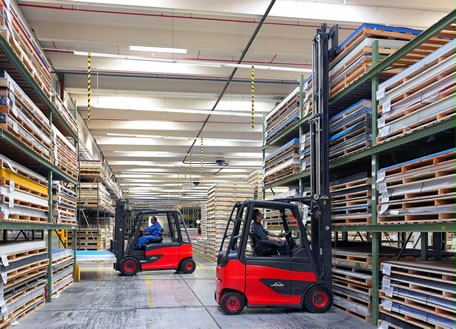 Linde E20-E50 Electric forklift series |
By the end of the third trading quarter of 2011, the UK's Barloworld Handling and Translift Bendi, Europe's KION and Jungheinrich Groups, the USA's NACCO and Cascade all reported greatly improved trading figures, reflecting a general trend within the materials handling sector. In China, outstanding financial figures were reported by ET Net News for trading group Good Friend whose forklift division saw an increase of 80% on the previous year's sales revenues in the 11 months to 30 November, 2011; total sales were RMB252 million (USD40 million).
In earthquake-affected Japan, materials handling manufacturers found the year a little harder but still managed to post improved figures. Toyota's material handling division reported in the six months to September, 2011 a 20% improvement, with sales totalling JPY276.9 billion (USD3.59 billion). A Toyota spokesman said that improved trading figures were due to "improved sales in both domestic and overseas markets, while keeping to a minimum the impact of parts shortages from domestic suppliers affected by the earthquake".
2012 forecastsDespite reassuringly strong figures in 2011, the consensus among manufacturers and forecasters is that materials handling markets will continue to improve only marginally in 2012, although there is still a strong belief in the BRIC (Brazil, Russia, China and India) economies.
The Materials Handling Industry of America (MHIA) released its quarterly report in September, forecasting growth of 7% in materials handling equipment orders in 2012. MHIA executive consultant Hal Vandiver said industrial production activity appears to be softening and factory operating rates are forecast to improve only modestly. Vandiver added that the downgrades in US GDP, consumption and investment reflected a US and global concern about the fragility of current world economies.
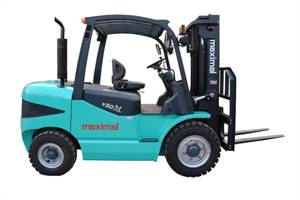 Maximal mini 5t diesel forklift |
The US-based Equipment Leasing and Finance Foundation published its US Economic Outlook Report at the end of 2011, predicting that investment in the US equipment and software markets would grow by 9% in 2012. The report indicated that investment in industrial equipment would be hampered by macro-trends, which may cause some deceleration in growth from its recent peak. Investment in the US is being aided by slowly improving credit market conditions, but growth will be moderate until demand puts more pressure on capacity, according to the report. What the credit market will be like in Europe in 2012 is anyone's guess, but at the moment it looks like tightening further. In China, meanwhile, credit is being affected by a fragile housing market.
BRICs and mortarDespite the financial recoveries made in the materials handling sector in 2011, there is continuing uncertainty over confidence in the global financial sector and even the reliable BRICs are not looking so reliable in some quarters. Goldman Sachs Group, the company which coined the term BRIC, says the best is over, according to a Bloomsberg Business Week report published last week. Average economic growth in the four nations will decelerate to 6.1% in 2012 from a high of 9.7% in 2007, according to September estimates by the International Monetary Fund, with the decline attributed to higher wages, higher interest rates and currency volatility in the BRIC regions.
The good news is that there are plenty of materials handling companies that still regard investment in Brazil, Russia, India and China as viable. Mitsubishi Heavy Industries (MHI) believes that the heavy-duty materials handling systems and port cranes sectors are expected to grow significantly in Asia, particularly India which has indicated port facility improvements as one of its main economic strategies. MHI has recently completed a joint venture with Anupam Industries Ltd to manufacture heavy-duty equipment. The venture is aimed at aggressively exploring the burgeoning Indian, Middle East and African shipping sector.
Hans-Georg Frey, chairman of the board of management of Jungheinrich, said in November that "development of our company's business will be dominated by growth and shaping the future for profitable growth through the end of 2011 and beyond. To this end, we will improve our marketshare in individual regions and enlarge our sales footprint in the growth markets of Eastern Europe, Asia and Latin America. Furthermore, we are making forward-looking investments; for example, in the construction of the Qingpu factory in China and of the spare parts centre in Kaltenkirchen."
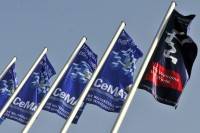 CeMat 2011 |
Recent Kion Group statistics indicating sales of 131,000 forklifts to China in the first half of 2011 meant that one in four units worldwide was sold to China - now the second-largest market in the world. KION not only has a number of joint ventures in China but also India and Brazil. The second quarter of 2011 saw KION group entering an alliance with Voltas Material Handling Private Limited of India for developing, manufacturing, selling and servicing forklifts in the region. Voltas is currently building a new plant in Pune, India. Meanwhile, in São Paulo, Brazil, KION has set up a plant for manufacturing IC forklifts to satisfy regional demand. The plant is expected to be fully operational by early 2012.
In April 2011, Italian forklift fork manufacturer Bolzoni Group signed a joint venture agreement with Chinese company Huaxin Forks and also plans to acquire 20% of the company's share capital. Bolzoni is investing EUR1.9million (USD2.75 million) in the deal and says its vision is to "secure a place in a market with volumes higher than the European and US markets together".
Enduring issues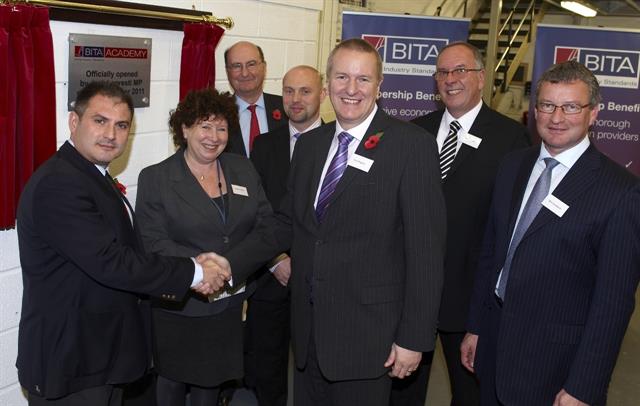 James Clark, secretary-general BITA at the opening of the BITA academy |
Sadly, forklift driver safety was again an issue in 2011. The UK's Fork Lift Truck Association (FLTA) found this year that over 1.2 million workers in the UK alone were at risk of serious accident from a forklift. Each year, five to 10 Britons are killed by forklifts and about 400 hospitalised with life-threatening injuries. Those at risk included not only drivers but also van drivers, unloading staff and work-site pedestrians. Better news is that provisional workplace accident figures from the Health & Safety Executive show that forklift-related deaths have fallen almost two-thirds since 2006/07.
An issue for both the FLTA and the British Industrial Truck Association (BITA) and one identified by
Forkliftaction.com News in its feature on forklift refurbishments in November is the increasing scarcity of suitably trained and qualified forklift technicians. With this in mind, BITA and the FLTA announced a wide range of apprenticeship options for students and their employers during 2011. In May, the FLTA unveiled its scheme operated in conjunction with remit training and North Warwickshire & Hinckley College. November saw the official launch of the BITA Academy, the result of a strategic partnership with City of Bristol College which aims to produce specialist engineers with the necessary experience and skills.
Environmental issues, sustainability and fuel-efficient machines were still an issue for materials handling consumers in 2011. A recent Crown forklift survey of 600 forklift users indicated that environmental sustainability and energy efficiency issues were important when making purchasing decisions. The survey found that 83% of respondents believed that environmental sustainability was important when purchasing a new forklift and 95% felt that energy efficiency was a priority. Matt Logan, Crown director of global marketing, believes that "Crown customers are interested in new and innovative ways to minimise waste, manage energy and maximise productivity".
It was no coincidence that CeMat Europe's 2011 theme, 'Sustainability in Intralogistics', tapped into the collective views of the materials handling community. The industry's largest equipment exhibition last year saw over 53,000 visitors and many forklift exhibitors chose CeMat to debut new equipment and technologies in keeping with the theme and the concerns of their buyers. STILL introduced the Hybrid forklift RX70 in the 3-3.5 T range, Linde introduced its E20-E50 electric forklift series, Maximal chose Cemat to showcase its new mini 5 T diesel forklift built specifically with the US market in mind, and Clark launched the 4, 4.5 and 5 T options to its GEX series, to name just a few.
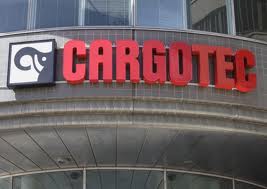 Cargotec Headquarters, Tampere |
They say that a recession is the best time to invest in research and development, and in October, Finnish company Cargotec announced plans to invest EUR35 million (USD46.6 million) in building a technology and competency centre in Tampere, Finland. CEO Mikael Mäkinen said Tampere will serve as "the spearhead for technologies related to energy efficiency and the intelligent use of machines".